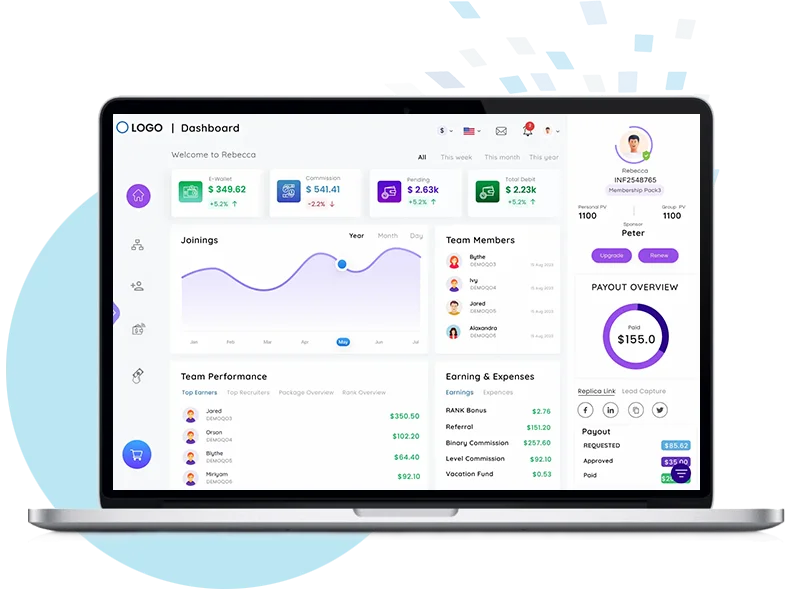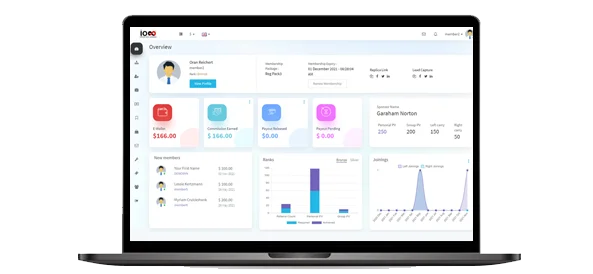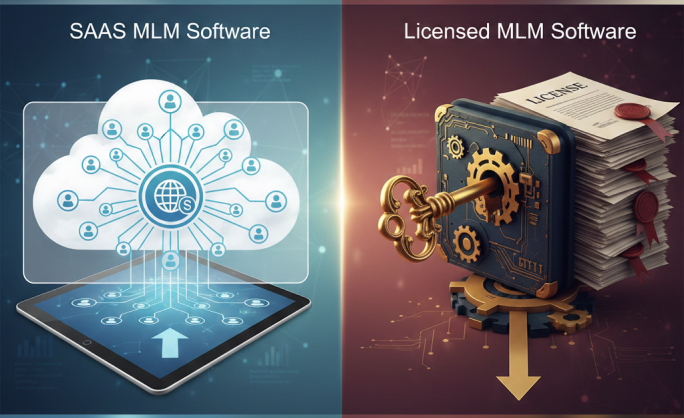Multi-Level Marketing (MLM) is a business model where people, known as distributors or members, sell products or services directly to consumers. They earn commissions not only from their own sales but also from the sales made by the people they recruit into the business.
This creates a structure where distributors build a team, or downline, and benefit from the sales made by their recruits. MLM offers the potential to earn significant income through personal sales and the sales made by their team.
Understanding MLM Payout Automation
In the MLM industry, efficient MLM payout processes are crucial for maintaining the trust and motivation of the distributors. Timely and accurate commission payments are essential to ensure that participants remain engaged and committed to the business. Any delays or errors in payouts can lead to dissatisfaction, decreased motivation, and potential attrition among distributors.
What is MLM Payout Automation?
MLM payout automation uses software to manage the payment of commissions and bonuses in Multi-Level Marketing companies. It makes sure that payments to distributors are accurate and on time, reducing mistakes and saving time. Automated systems handle complex commission rules, process many transactions quickly, and give real-time updates to distributors about their earnings. This technology makes the payout process more efficient, transparent, and reliable, helping to keep MLM participants happy and motivated.
Key components and functionalities of MLM payout automation systems
MLM payout automation systems are essential for efficiently managing and distributing commissions and bonuses to members within a network.
- Software Platforms: These systems manage calculations and data. They offer customizable features to fit different MLM structures.
- Smart Contracts: These self-executing contracts automate commission and bonus distribution. Payments follow predefined rules without needing intermediaries.
- Commission Engines: This core feature calculates payouts based on sales volume, rank, and recruitment levels. It ensures accurate and fair compensation.
- Payment Gateways: Integration with various payment gateways allows efficient payment processing through bank transfers, digital wallets, and other methods. This ensures prompt earnings for members.
- Reporting and Analytics: Real-time tools offer insights into sales performance, payouts, and network health. This data aids informed decisions and transparency.
- Compliance and Security: Automated systems handle tax reporting, legal requirements, and advanced security measures to protect data. Compliance with local and international regulations is ensured.
How the MLM Payout Automation Works
MLM payout automation uses advanced software to manage and execute complex calculations for distributing earnings. Here’s a simplified breakdown of the process:

Data Collection:
The system gathers data from sales, recruitment activities, and member performance metrics.

Data Input and Integration:
This data is entered into the MLM software. Integration with CRM and ERP systems ensures smooth information flow.

Commission Calculation:
The software calculates commissions based on predefined rules, including sales commissions, recruitment bonuses, and other incentives.

Smart Contract Execution:
If using blockchain, smart contracts automatically execute payout terms, ensuring payments follow the MLM compensation plan without manual effort.

Payment Processing:
The system connects with various payment gateways to process earnings, which can be received through bank transfers, digital wallets, or cryptocurrency.

Real-Time Reporting and Analytics:
The system generates real-time reports, offering insights into payouts, member performance, and overall business health. This helps administrators make informed decisions and maintain transparency.

Compliance and Security Checks:
Automated checks ensure all payouts comply with local and international regulations. Advanced security measures protect sensitive data and prevent fraud.
Workflow of an Automated Payout System
Here’s an example workflow of an MLM payout automation system
-
Member Registration: New members register and provide their personal and banking details.
-
Sales and Recruitment Data Entry: Sales and recruitment activities are recorded in the system.
-
Periodic Data Sync: The system periodically synchronizes data from CRM, ERP, and other business systems.
-
Commission Calculation Run: The commission engine runs scheduled calculations based on the latest data.
-
Smart Contract Trigger: If applicable, smart contracts are triggered to distribute payouts.
-
Payment Execution: Payments are processed through integrated gateways and deposited into members’ accounts.
-
Reporting Generation: Real-time reports are generated and made available to administrators and members.
-
Compliance Audits: Regular audits are performed to ensure compliance with regulations and security protocols.
Benefits of MLM Payout Automation
Efficiency and Time Savings
Automation streamlines payout processes by eliminating the need for manual calculations and paperwork, significantly speeding up the entire payout process. This ensures that distributors are paid on time, which enhances their satisfaction and trust in the system. Additionally, automation reduces the administrative workload, allowing staff to focus on other important tasks that drive business growth and improve overall efficiency.
Accuracy and Error Reduction
The use of automated systems for payout calculations drastically reduces the incidence of manual errors. These systems employ precise algorithms to calculate commissions, minimizing human errors and ensuring that distributors receive the correct amount. This accuracy is crucial for maintaining trust and satisfaction among distributors, as they can rely on the system to provide consistent and accurate payouts.
Cost-Effectiveness
Automating MLM payouts leads to lower operational costs by reducing the need for a large administrative team to handle these tasks. It saves money by cutting down on errors and the associated costs of correcting them. While manual payout processes require more personnel and are time-consuming, increasing overall costs, automated systems, though requiring an initial investment, significantly lower ongoing operational expenses, making them a cost-effective solution in the long run.
Scalability
Automated payout systems are designed to handle growing networks and the complexities of payout structures efficiently. They can easily adapt to an increasing number of distributors without additional administrative burden. This scalability is essential for supporting the growth of the MLM business, as it allows the company to manage complex commission structures and expanding networks smoothly and efficiently.
Enhanced Security
Automated payout systems come with improved security measures, ensuring secure transactions through encrypted payment processing. They protect sensitive data from breaches and fraud, which is crucial in maintaining the confidentiality and integrity of distributor information. Secure transactions and data protection build trust with distributors by ensuring that their personal and financial data are secure, thereby enhancing the overall credibility of the MLM business
Key Features of MLM Payout Automation Software
Automated Commission Calculations
MLM payout automation software uses sophisticated algorithms to calculate commissions automatically based on sales data and predefined commission structures. You can use an MLM Calculator to calculate the commissions accurately.This ensures accuracy and consistency in payouts, eliminating the errors associated with manual calculations. By streamlining the commission calculation process, the software provides reliable and timely payouts to distributors.
Multiple Payment Gateway Integration
The software supports various payment gateways, including bank transfers, PayPal, and digital wallets, facilitating smooth and secure payment processes across different regions. This flexibility in payment options ensures that distributors can receive their earnings through their preferred method, enhancing their satisfaction and trust in the system.
Real-Time Reporting and Analytics
Access to real-time data is a significant benefit of MLM payout automation software. It provides instant access to earnings and performance metrics, helping distributors make informed decisions. The software offers various types of reports and analytics, including sales performance reports, commission summaries, and payout histories. Additionally, it provides insights into distributor growth, sales trends, and network expansion, enabling businesses to strategize effectively.
Compliance and Tax Management
The software ensures compliance with local and international regulations by keeping track of regulatory changes and updating payout processes accordingly. It generates compliant reports for different jurisdictions, simplifying the process of adhering to regulatory requirements. Moreover, the software simplifies tax management and reporting by automatically calculating tax obligations based on earnings and providing necessary documentation for tax filings. This comprehensive approach to compliance and tax management reduces administrative burdens and ensures that businesses remain compliant with relevant laws.
Implementing Smart Contracts in MLM
What are smart contracts?
Smart contracts are self-executing contracts with the terms of the agreement written directly into code. They operate on blockchain technology, ensuring that all terms and conditions are enforced automatically without intermediaries. Smart contracts are particularly useful in situations where transparency, security, and automation are essential, such as in MLM payout processes.
Definition: A smart contract is a digital protocol that facilitates, verifies, or enforces the negotiation or performance of a contract.
Blockchain Technology: Smart contracts are stored and executed on a blockchain, a decentralized ledger that records transactions securely and tamper-proof across multiple computers.
Role of Smart Contracts in MLM Payout Automation
Smart contracts can transform how MLM businesses handle payouts by automating the entire process, ensuring transparency, and providing security. Here’s how they play a crucial role:
Automation: Smart contracts automatically execute the terms of the MLM compensation plan. They handle tasks like calculating commissions, distributing bonuses, and ensuring all payments follow the agreed-upon rules.
Transparency: All transactions recorded on the blockchain are transparent and auditable by all parties. This transparency builds trust among network members, as they can see exactly how their commissions and bonuses are calculated and distributed.
Security: Blockchain technology ensures that all transactions are secure and immutable. Once a smart contract is executed, the data cannot be altered, preventing fraud and ensuring accurate payouts.
Advantages of Using Blockchain Technology for Payouts
Blockchain technology offers several benefits that make it ideal for MLM payout automation:
Decentralization: Transactions are recorded across multiple nodes, eliminating the need for a central authority and reducing the risk of data breaches.
Immutability: Once recorded on the blockchain, transactions cannot be altered or deleted, ensuring data integrity.
Cost Reduction: Automating the payout process and eliminating intermediaries reduces operational costs.
Speed: Blockchain transactions can be processed quickly, ensuring members receive their payouts promptly.
Challenges in MLM Payout Automation
Initial setup and integration issues:
Setting up the system can be complex and time-consuming.
Requires integration with existing MLM management software and databases.
Data security and privacy concerns:
Ensuring the protection of sensitive distributor information.
Compliance with data protection regulations.
Adapting to different MLM structures:
Customizing the system to accommodate various commission plans and structures.
Ensuring flexibility to support different MLM business models.
How to Choose the Right MLM Payout Automation System
Assessing Your Business Needs
Understanding Specific Requirements of Your MLM Business:
Identify Unique Aspects
Consider the specific structure of your MLM business, including the types of products or services sold, the typical sales cycles, and the demographic spread of your distributors. For example, if your MLM has a complex commission structure with multiple tiers and bonuses, the payout system needs to handle these complexities seamlessly.
Determine Pain Points
Evaluate current challenges in your payout process. Are you facing delays in payments? Are there frequent errors in commission calculations? Understanding these pain points will help you prioritize features in a new system.
Scalability Needs
Assess your growth projections. If you anticipate significant growth in the number of distributors or international expansion, you’ll need a system that can scale and adapt without requiring a complete overhaul.
Creating a Checklist of Must-Have Features:
Automated commission calculations
Multiple payment gateway integration
Real-time reporting and analytics
Compliance and tax management
Customizable payout structures
User-friendly interface
Evaluating Software Providers
Criteria for Selecting a Reliable Provider:
Experience in MLM Industry: Providers with a history of working with MLM businesses understand the unique challenges and requirements of the industry.
Customer Support: Ensure that the provider offers comprehensive customer support, including training resources, troubleshooting assistance, and regular updates.
Reviews and Testimonials: Look for feedback from other MLM companies that have used the provider’s software. Positive reviews and case studies can give you confidence in the provider’s reliability.
Ongoing Improvements: Choose a provider committed to continuous improvement and innovation, ensuring that the software evolves with changing industry needs.
Questions to Ask Potential Providers:
Compatibility: “How does your software handle different MLM compensation plans?”
Security: “What security measures are in place to protect sensitive data?”
Integration: “Can the system integrate with our existing MLM software and databases?” MLM Software Integrations play a key role.
Support: “What kind of customer support and training do you offer?”
Integration with Existing Systems
Importance of Seamless Integration with Current Software:
Smooth Data Flow: Integration ensures that data from sales, distributors, and commissions flows smoothly between different platforms, reducing the risk of errors and inconsistencies.
Efficiency: A seamless integration reduces manual data entry and duplication, saving time and effort for your administrative team.
Steps to Ensure Smooth Integration:
Collaborate with the Provider: Work closely with the software provider to plan the integration process, identifying potential challenges and solutions.
Testing: Conduct thorough testing in a controlled environment before full deployment to ensure compatibility and functionality.
Training: Provide comprehensive training to staff and distributors on using the new system to ensure a smooth transition and adoption.
Additional Considerations
Scalability:
Choose a system that can grow with your business, handling an increasing number of distributors and transactions without compromising performance.
Customization:
Ensure the software can be customized to fit your specific business model, including unique commission structures and reporting needs.
Compliance:
Verify that the system can manage compliance with local and international regulations, including tax laws and reporting requirements, to avoid legal complications.
Cost-Effectiveness:
Consider the initial investment and ongoing cost of the software, balancing them against the expected benefits and savings from automation. Look for a solution that provides the best value for money without compromising on essential features.
Conclusion
By thoroughly assessing your business needs, carefully evaluating software providers, ensuring seamless integration with your existing systems, and considering additional factors like scalability, customization, compliance, and cost-effectiveness, you can choose the right MLM automation system to enhance your business efficiency and support sustainable growth.
Incorporating MLM automation is an investment in the future success and stability of your business. By making use of the latest technologies, including blockchain and smart contracts, MLM companies can ensure secure, transparent, and efficient payout processes. This not only enhances distributor satisfaction but also positions the company for sustainable growth and success. Embracing MLM automation simplifies complex tasks, allowing your business to operate smoothly and effectively in the competitive MLM industry.
FAQ
1How does MLM payout automation benefit businesses?
Efficiency and Time Savings: Automates commission calculations and payments, saving time.
Accuracy and Error Reduction: Reduces human errors, ensuring accurate payouts.
Cost-Effectiveness: Lowers operational costs by minimizing manual work.
Scalability: Adapts to growing distributor networks and complex structures.
Enhanced Security: Protects sensitive data with secure transactions.
Real-Time Reporting: Offers instant access to earnings and performance data.
Compliance and Tax Management: Simplifies adherence to regulations and tax reporting.
2How to automate your network marketing business?
Identify Key Processes: Determine tasks like commission calculations and payment processing for automation.
Choose the Right Software: Select an MLM payout automation system that meets your needs and integrates well.
Implement and Test: Set up the software, ensure integration, and train your team on its use.
3How do smart contracts enhance MLM payout processes?
Automation: Automatically execute and enforce commission payments when conditions are met.
Transparency: Provide clear, unalterable terms visible to all parties.
Security: Ensure secure and tamper-proof transactions on the blockchain
4What are the common challenges in implementing MLM payout automation?
Initial Setup and Integration: Complexity and time required to set up and integrate with existing systems.
Data Security and Privacy: Ensuring protection of sensitive distributor data.
Adapting to Different MLM Structures: Customizing the system to fit unique MLM models and commission plans.










